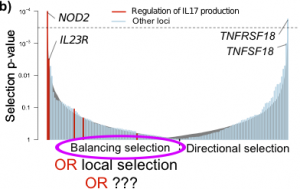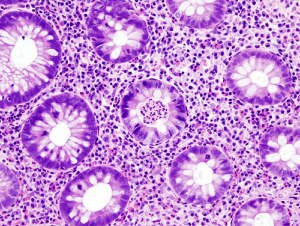 As I mentioned a few weeks ago, we recently published a large study into the genetics of inflammatory bowel disease (IBD), which included a number of analyses digging into the biology and evolutionary history of IBD genetic risk. Gratifyingly, our paper has stimulated a lot of discussion among other scientists, which has generated several ideas about future directions for this work. One question that was raised by several population-genetics experts at ASHG was about our natural selection analysis, and in particular our claim to discover an enrichment of balancing selection in IBD loci. In the paper, we found clear signals of natural selection on IBD loci, a subset of which we interpreted as balancing selection. In this post I will set out how I came to this conclusion, but then outline another explanation that could explain the results: recent local positive selection in Europeans.
As I mentioned a few weeks ago, we recently published a large study into the genetics of inflammatory bowel disease (IBD), which included a number of analyses digging into the biology and evolutionary history of IBD genetic risk. Gratifyingly, our paper has stimulated a lot of discussion among other scientists, which has generated several ideas about future directions for this work. One question that was raised by several population-genetics experts at ASHG was about our natural selection analysis, and in particular our claim to discover an enrichment of balancing selection in IBD loci. In the paper, we found clear signals of natural selection on IBD loci, a subset of which we interpreted as balancing selection. In this post I will set out how I came to this conclusion, but then outline another explanation that could explain the results: recent local positive selection in Europeans.
Continue reading ‘Looking closer at natural selection in inflammatory bowel disease’
 Out in Nature this week is a paper by three Genomes Unzipped authors reporting 71 new genetic associations with inflammatory bowel disease (IBD). This breaks the record for the largest number of associations for any common disease, and includes many new and interesting biological insights that you should all go and read about in the paper itself (pay-to-access I’m afraid) or on the Sanger Institute’s website.
Out in Nature this week is a paper by three Genomes Unzipped authors reporting 71 new genetic associations with inflammatory bowel disease (IBD). This breaks the record for the largest number of associations for any common disease, and includes many new and interesting biological insights that you should all go and read about in the paper itself (pay-to-access I’m afraid) or on the Sanger Institute’s website.
 A paper in Nature Genetics this week reports the results of a large meta-analysis of GWAS studies into ulcerative colitis, which more than doubles the number of loci known for the disease from 18 to 47. This pushes the proportion of heritability explained from 11 to 16%, and sheds more light on the shared and non-shared pathways between ulcerative colitis and Crohn’s disease, along with the interplay with other immune and inflammatory disorders.
A paper in Nature Genetics this week reports the results of a large meta-analysis of GWAS studies into ulcerative colitis, which more than doubles the number of loci known for the disease from 18 to 47. This pushes the proportion of heritability explained from 11 to 16%, and sheds more light on the shared and non-shared pathways between ulcerative colitis and Crohn’s disease, along with the interplay with other immune and inflammatory disorders.
 RSS
RSS Twitter
Twitter
Recent Comments